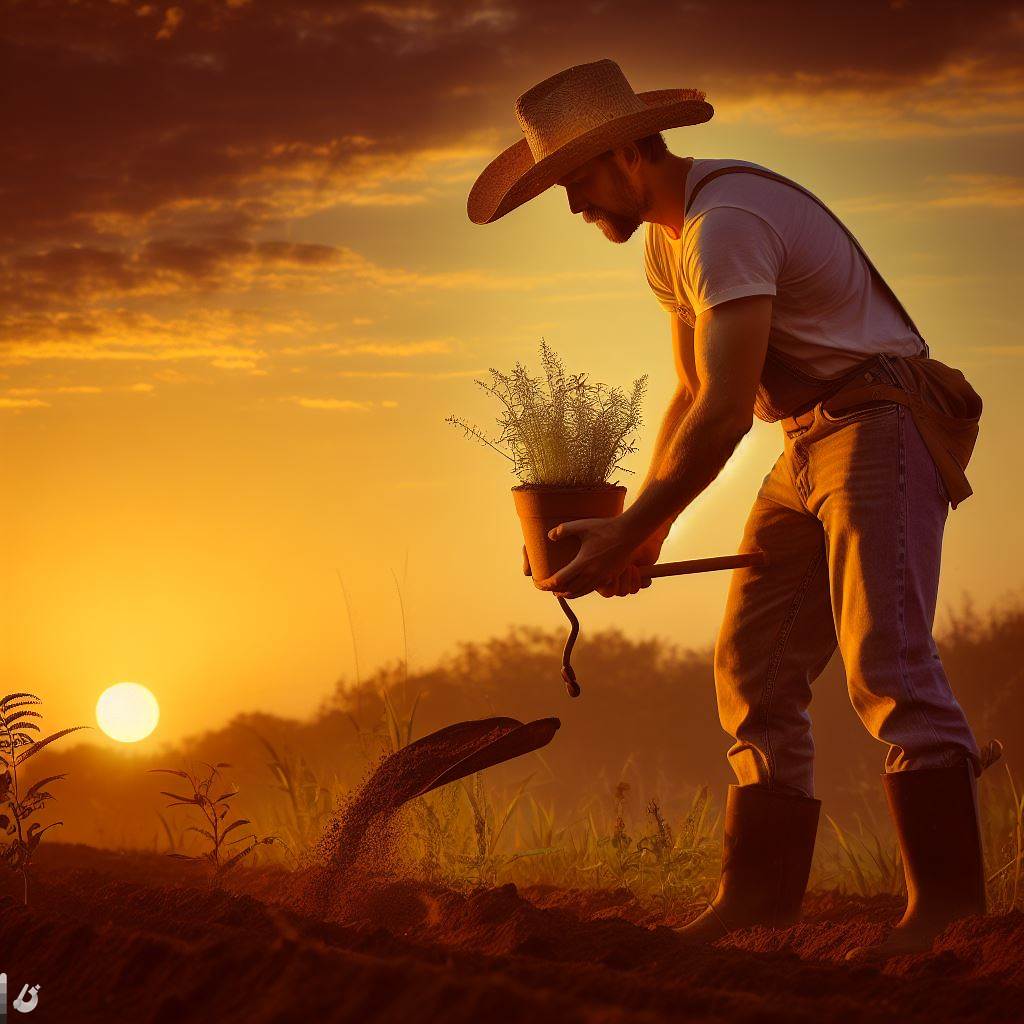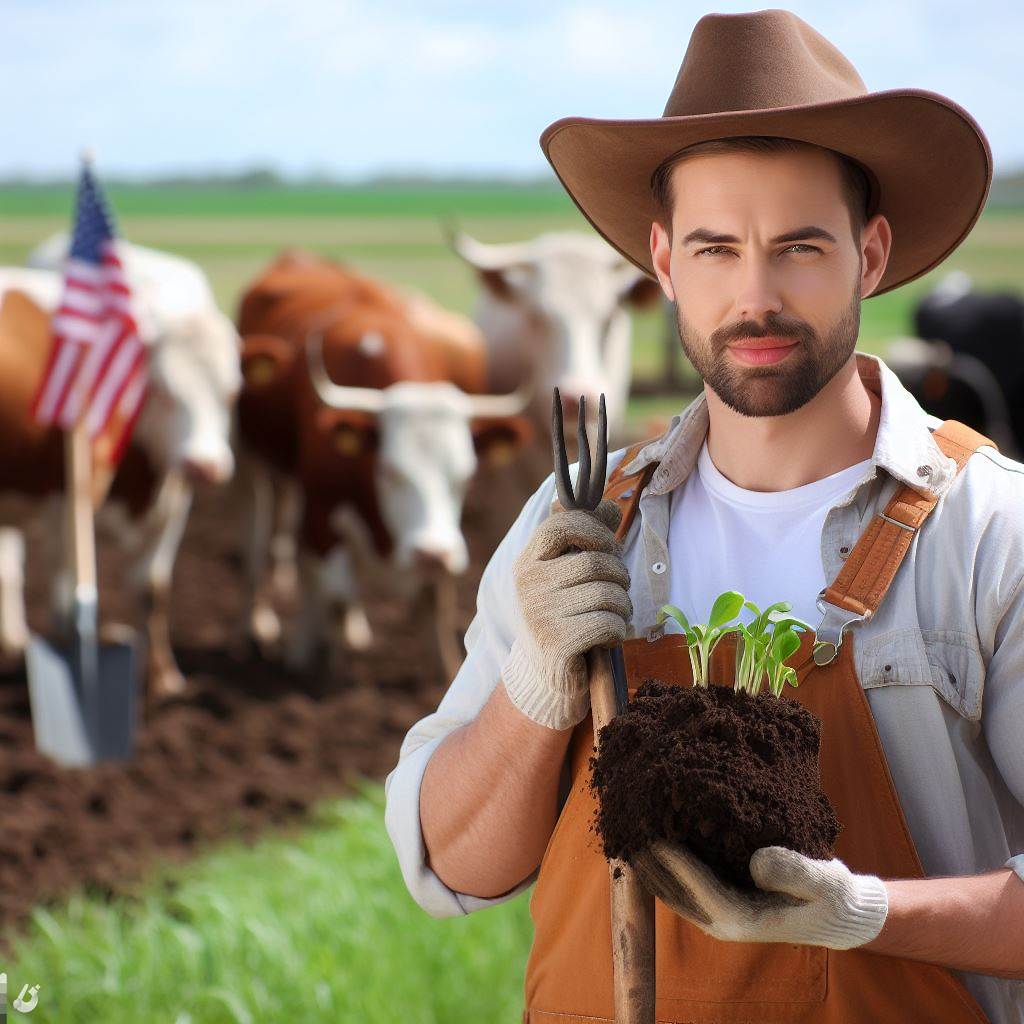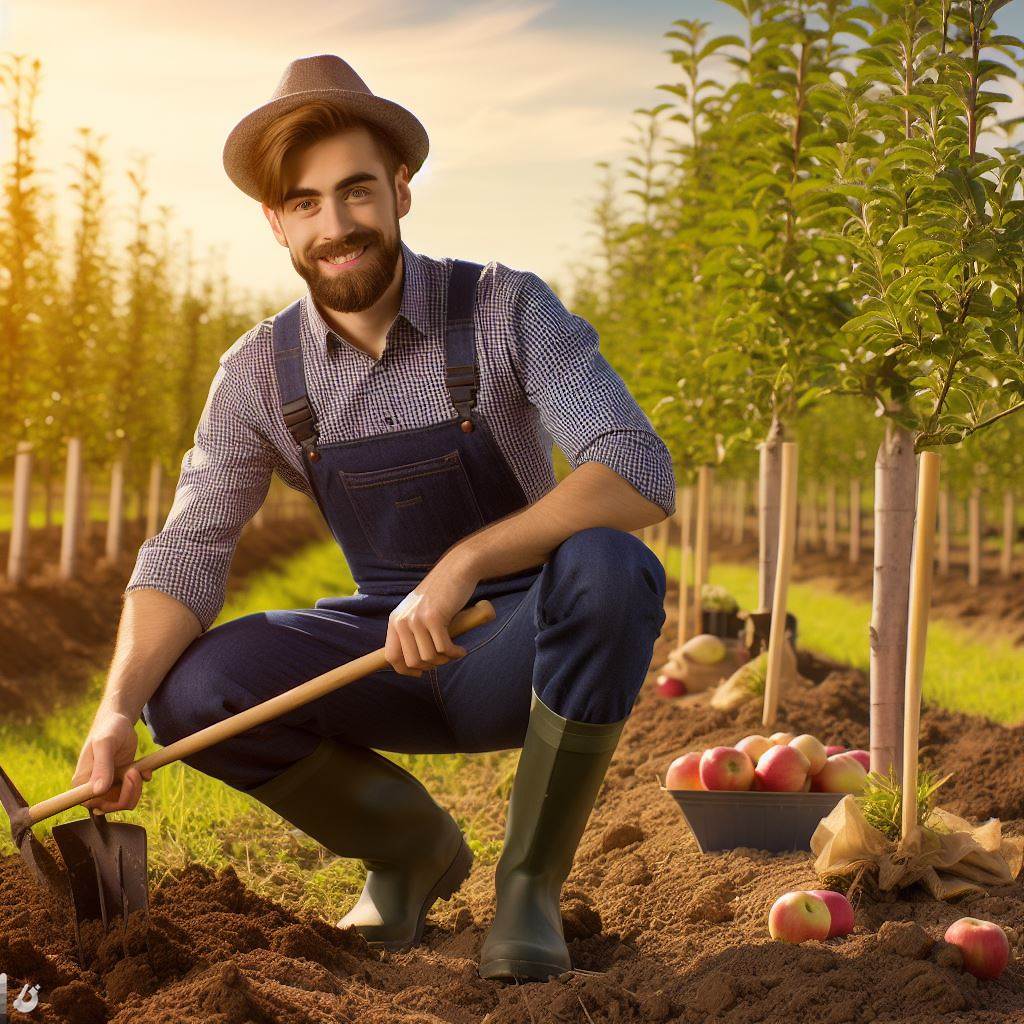Introduction
Organic farming is an eco-friendly alternative to conventional agriculture, emphasizing soil health and biodiversity.
This method avoids synthetic fertilizers and pesticides, promoting the use of organic matter and natural pest control.
By choosing organic farming, farmers contribute to a healthier environment and offer consumers chemical-free produce.
The journey of an organic farmer begins with carefully selecting high-quality, non-GMO seeds.
These seeds are the foundation upon which a successful organic farm is built.
Once the seeds are selected, the farmer meticulously prepares the soil, ensuring it is nutrient-rich and well-drained.
Planting the seeds is a crucial step, and organic farmers always follow the recommended planting guidelines.
Throughout the growing season, organic farmers diligently monitor their crops, keeping an eye out for pests or diseases.
Instead of using chemical pesticides and herbicides, organic farmers use natural methods to control pests, such as companion planting or biological controls.
Harvesting is the most rewarding part of the organic farming journey, as it signifies the success of all the hard work.
Organic farmers take pride in delivering high-quality, nutritious produce to consumers who value health and sustainability.
In short, this blog section will provide valuable insights into the journey of an organic farmer, from seed selection to harvest.
Organic farming is a sustainable practice that benefits both the environment and consumers’ well-being.
Organic Farming: A Sustainable Approach
Definition and Principles of Organic Farming
Organic farming refers to the practice of growing crops and raising livestock without the use of synthetic fertilizers, pesticides, genetically modified organisms (GMOs), or other chemicals.
It is based on principles such as:
Transform Your Agribusiness
Unlock your farm's potential with expert advice tailored to your needs. Get actionable steps that drive real results.
Get Started- Soil health: Organic farmers prioritize nurturing and maintaining the health of their soil through natural methods, such as composting and crop rotation.
- Biodiversity: Organic farms aim to cultivate diverse ecosystems by promoting the growth of various plant species and providing habitats for beneficial organisms.
- Ecological balance: Organic farming practices aim to work in harmony with nature, minimizing negative impacts on the environment and preserving natural resources.
- Animal welfare: Organic farmers prioritize the well-being of the animals they raise, providing them with access to outdoor areas, healthy diets, and a stress-free environment.
- Avoidance of synthetic inputs: Organic farmers refrain from using synthetic pesticides, fertilizers, hormones, and genetically engineered materials.
Benefits of Organic Farming
1. Environmental Conservation
Organic farming has numerous environmental benefits that contribute to the conservation of natural resources and the preservation of biodiversity.
By avoiding synthetic pesticides and fertilizers, organic farmers reduce water pollution and protect wildlife and beneficial insects.
2. Preservation of Soil Fertility
Organic farming practices prioritize soil health, which helps maintain high fertility levels over the long term.
By utilizing organic matter and natural fertilizers, such as compost and manure, organic farmers enhance soil structure and nutrient content, reducing erosion and improving soil moisture retention.
3. Health Benefits for Consumers
Organic produce is grown without the use of synthetic chemicals, making it a healthier option for consumers.
In this context organic crops tend to have higher levels of beneficial nutrients, such as antioxidants, and lower levels of pesticide residues, which can have harmful effects on human health.
Organic farming also promotes sustainable agricultural practices, reduces greenhouse gas emissions, and supports local communities by fostering fair trade and minimizing reliance on fossil fuels.
Moreover, the absence of synthetic chemicals and genetically modified organisms in organic farming helps in the preservation of biodiversity and the long-term sustainability of our ecosystems.
In brief, organic farming represents a sustainable approach to food production.
It embraces principles that prioritize soil health, biodiversity, ecological balance, and animal welfare.
The environmental and health benefits associated with organic farming make it an attractive choice for both farmers and consumers who are concerned about the impact of conventional agriculture on our planet and their well-being.
The Journey Starts with Seeds
Importance of selecting high-quality organic seeds
Starting an organic farm begins with selecting the right seeds that are of high quality.
Choosing high-quality organic seeds is crucial as they determine the success of the entire farming process.
These seeds are free from chemical treatments, ensuring the production of healthy and organic crops.
It is essential to source seeds from reputable suppliers who specialize in organic seeds.
Variety selection based on climate and intended use
Selecting the right variety of seeds based on climate and intended use is vital for organic farming.
Different regions have different climates, so it is important to choose seeds that can thrive in those conditions.
Considering the intended use of the crops is also necessary to meet the market demand and personal preferences.
By selecting suitable varieties, organic farmers can maximize their chances of a successful harvest.
Methods of sourcing organic seeds
To obtain organic seeds, there are several methods that organic farmers can consider:
1. Purchasing from certified organic suppliers
Certified organic suppliers provide seeds that are guaranteed to be organic and of high quality.
These suppliers follow strict organic standards, ensuring the integrity of the seeds.
2. Saving seeds from previous crops
Saving seeds from previous organic crops allows farmers to maintain the desired traits and adaptability.
This method also helps preserve heirloom varieties and promotes seed diversity in organic farming.
Showcase Your Farming Business
Publish your professional farming services profile on our blog for a one-time fee of $200 and reach a dedicated audience of farmers and agribusiness owners.
Publish Your Profile3. Participating in seed exchanges or networks
Seed exchanges or networks allow organic farmers to trade or share seeds with fellow farmers.
This collaborative approach supports the organic farming community and promotes seed diversity.
By engaging in these methods, organic farmers can ensure a steady supply of high-quality organic seeds for their farm.
In fact, the journey of an organic farmer begins with selecting high-quality organic seeds.
These seeds are crucial for a successful and sustainable organic farming venture.
Through careful selection based on climate and intended use, organic farmers can maximize their chances of success.
Sourcing organic seeds can be done through certified organic suppliers, saving seeds from previous crops, or participating in seed exchanges.
By prioritizing the quality and integrity of seeds, organic farmers lay a strong foundation for their farming journey.
Read: Grape Expectations: A Vintner Journey
Soil Preparation and Nutrient Management
Soil testing and analysis for organic farming
Before starting an organic farm, it is crucial to conduct soil testing and analysis. This helps determine the soil quality and nutrient composition.
Enhancing soil fertility through organic amendments
Organic amendments are essential for improving soil fertility in organic farming systems.
1. Compost and manure application
Adding compost and manure to the soil helps replenish essential nutrients and improve overall soil health.
2. Cover cropping and green manures
Planting cover crops and incorporating green manures is beneficial for adding organic matter and increasing soil fertility.
Effective weed and pest management techniques
Weed and pest control is crucial in organic farming to maintain healthy crops without the use of synthetic chemicals.
1. Mulching
Mulching helps suppress weed growth, conserve soil moisture, and enhance soil structure.
2. Crop rotation
Rotating crops helps prevent the buildup of pests and diseases, improves soil health, and maintains balanced nutrient levels.
3. Biological control methods
Encouraging natural predators and beneficial insects to control pests can effectively minimize crop damage in organic farming.
In essence, proper soil preparation and nutrient management are crucial for the success of organic farming.
Conducting soil testing and analysis, utilizing organic amendments, and implementing effective weed and pest management techniques contribute to maintaining healthy soil and cultivating thriving organic crops.
Read: Harvest Tales: Life in the Wheat Fields
Organic Farming Practices
Organic farming practices are crucial for the success and sustainability of organic farmers.
These practices aim to ensure the health of the crops, protect the environment, and produce high-quality organic products.
In this section, we will explore some key organic farming practices that organic farmers implement.
Crop Planning and Rotation
One of the fundamental practices in organic farming is crop planning and rotation.
Organic farmers maximize crop diversity within their farm, which is beneficial for several reasons.
First, a diverse crop rotation creates a healthier ecosystem within the farm.
Different crops attract various beneficial insects and pollinators, promoting biodiversity.
Cop rotation helps to minimize the risk of diseases and pests.
By rotating crops, organic farmers disrupt the life cycles of pests and break the disease cycles.
This reduces the accumulation of pathogens and pests in the soil, making it a healthier environment for future crops.
Crop rotation is a proactive measure to prevent the buildup of pests and diseases, reducing the need for chemical interventions.
Water Conservation and Efficient Irrigation Methods
Water conservation is another important aspect of organic farming.
With increasing global water scarcity, organic farmers understand the significance of efficient water management.
They implement strategies to conserve water and use irrigation methods wisely.
Organic farmers use water-saving techniques such as drip irrigation and mulching.
Drip irrigation delivers water directly to the plant roots, minimizing water waste through evaporation or runoff.
Mulching helps retain soil moisture by reducing evaporation, preventing weed growth, and regulating soil temperature.
Organic farmers focus on improving soil health to enhance water retention.
Healthy soils with good organic matter content can absorb and retain water better.
By implementing practices such as cover cropping and adding organic matter, organic farmers create a soil structure that has improved water-holding capacity.
Showcase Your Farming Business
Publish your professional farming services profile on our blog for a one-time fee of $200 and reach a dedicated audience of farmers and agribusiness owners.
Publish Your ProfileNatural Fertilization Techniques
Organic farmers rely on natural fertilization techniques to provide essential nutrients to their crops.
They avoid synthetic fertilizers and use organic alternatives instead. Compost teas and liquid fertilizers are commonly used in organic farming.
These nutrient-rich solutions are made from compost or other organic materials, providing a balanced mix of vital nutrients to the crops.
Vermicomposting is a popular method used by organic farmers.
Vermicomposting involves the use of worms to break down organic waste materials, producing nutrient-rich worm castings.
These castings are then used as a natural fertilizer, enhancing soil fertility and plant growth.
Organic farming practices prioritize sustainability and long-term soil health.
By implementing crop planning and rotation, conserving water, and utilizing natural fertilization techniques, organic farmers can maintain a productive farm while minimizing environmental impacts.
These practices not only support the success of organic farmers but also contribute to a healthier and more sustainable agricultural system as a whole.
Read: Dawn to Dusk: A Dairy Farmer Story

Harvesting and Post-Harvest Handling
Indicators of crop readiness for harvest
- Inspect crops for color changes, size, and texture to determine if they are ready for harvest.
- Monitor the crop’s sugar content, acidity, and firmness to ensure optimal flavor and texture.
- Check for seed maturity and the presence of flowers or fruits to confirm if it’s harvest time.
Proper harvesting techniques to maintain crop quality
- Use sharp, clean tools to avoid damage to the plant and reduce the risk of disease transmission.
- Harvest in the early morning when temperatures are cooler, minimizing wilting and preserving freshness.
- Select ripe and undamaged produce, handling them gently to prevent bruising or other injuries.
- Remove weeds and debris from the harvested crop to maintain its cleanliness and quality.
- Keep harvested crops out of direct sunlight and protect them from heat and moisture to prevent spoilage.
Handling and storing harvested produce in organic systems
1. Preventing contamination
Clean and sanitize harvesting equipment regularly to avoid cross-contamination between different crops or harvest batches.
Train workers on proper hygiene and handwashing techniques to minimize the spread of diseases and pathogens.
Implement food safety protocols, such as using clean and dedicated containers for each crop to prevent contamination.
Regularly inspect harvest areas for potential sources of contamination, like wildlife or nearby pollutants.
2. Utilizing eco-friendly packaging materials
Choose packaging materials made from recyclable or biodegradable materials to reduce environmental impact.
Avoid using plastic bags or containers and opt for paper, cardboard, or compostable materials instead.
Ensure packaging materials are free from harmful chemicals or additives that might compromise the organic integrity.
Label the packaging clearly with crop variety, harvest date, and any relevant information for consumers.
In a nutshell, proper harvesting techniques and post-harvest handling are critical to maintaining the quality and integrity of organic crops.
By carefully monitoring crop readiness, using appropriate tools, and handling harvested produce with care, organic farmers can deliver fresh, nutritious, and safe products to their consumers.
Preventing contamination and utilizing eco-friendly packaging materials further contribute to sustainable and environmentally conscious farming practices.
Read: Hops and Dreams: The Craft Beer Farmer
Certification and Marketing
Overview of organic certification process
Organic certification involves a thorough inspection of farming practices and adherence to specific guidelines.
To become certified organic, farmers must submit an application, undergo inspections, and implement required changes.
The certification process ensures that organic farmers are producing food that meets strict organic standards.
Benefits and challenges of organic certification
Certification adds value to organic products, providing increased market demand and higher prices for farmers.
However, the certification process can be time-consuming, costly, and may require changes in farming methods.
Organic farmers face challenges such as transitioning to organic practices, increased record-keeping, and maintaining certification.
Marketing strategies for organic farmers
1. Targeting local markets and consumer groups
Organic farmers can focus on selling their products locally, building relationships with consumers who prioritize organic produce.
By establishing connections with local markets, farmers can capitalize on the growing demand for organic products.
2. Utilizing online platforms and social media
Organic farmers should embrace online platforms and social media to reach a wider audience and promote their products.
Creating a strong online presence can help farmers connect with consumers interested in organic farming practices.
Utilizing social media platforms such as Facebook, Instagram, and Twitter allows farmers to share their journey and attract customers.
Engaging content, such as behind-the-scenes photos and educational posts, can help build trust with consumers.
Online platforms also provide opportunities for organic farmers to sell their products directly to customers, increasing their profitability.
Incorporating e-commerce options and online marketplaces allows farmers to reach customers beyond their local area.
organic farmers need to understand and navigate the organic certification process to reap the benefits.
While certification may present challenges, it ultimately adds value to the farmer’s products.
Marketing strategies targeting local markets and utilizing online platforms can help organic farmers connect with customers and increase sales.
By combining certification and effective marketing techniques, organic farmers can achieve success in the competitive agricultural industry.
Showcase Your Farming Business
Publish your professional farming services profile on our blog for a one-time fee of $200 and reach a dedicated audience of farmers and agribusiness owners.
Publish Your ProfileSuccess Stories: Inspiring Examples of Organic Farmers
In this section, we will highlight successful organic farmers and their achievements, offering valuable lessons that can be learned from these inspiring success stories.
We hope these stories will encourage readers to pursue their own organic farming dreams.
Stories of Successful Organic Farmers
- John Peterson: With years of dedication and hard work, John transformed his small plot of land into a thriving organic farm, supplying fresh produce to local markets.
- Lisa Anderson: After facing initial obstacles, Lisa’s perseverance paid off as she built a prosperous organic farm, known for its premium vegetables and ethical practices.
- Michael Ramirez: Michael’s innovative techniques and commitment to sustainable agriculture have made him a trailblazer in the organic farming community.
- Sarah Thompson: Sarah’s passion for organic farming led her to create a successful farm-to-table business, connecting consumers directly with the farmers.
- David Martinez: Starting from scratch, David’s organic farm has grown into a multimillion-dollar operation, supplying organic products to major retailers nationwide.
Lessons from Success Stories
- Passion is Key: All the successful organic farmers share a deep passion for sustainable agriculture, which fuels their dedication and resilience.
- Embrace Innovation: These farmers are not afraid to explore new techniques and technologies that help improve yields and reduce environmental impact.
- Perseverance: They have faced numerous challenges and setbacks but have persisted, learning from failures and using them as stepping stones to success.
- Collaboration: Successful organic farmers understand the importance of building strong relationships within their community and collaborating with other farmers.
- Adaptability: Markets and consumer preferences are constantly changing, and these farmers have shown the ability to adapt to evolving trends and demands.
Encouraging Readers to Pursue Organic Farming Dreams
After learning about these inspiring success stories of organic farmers, it’s natural to feel motivated to embark on your own organic farming journey.
Here are a few encouraging words:
- Start Small: Begin with a small plot of land, carefully planning and nurturing your crops to gain experience and confidence.
- Seek Knowledge: Attend workshops, conferences, and connect with experienced organic farmers to learn valuable tips and techniques.
- Build a Support Network: Surround yourself with like-minded individuals who can offer advice, support, and encouragement along the way.
- Be Resilient: Organic farming can be challenging, but remember that failure is a part of the learning process. Stay determined and learn from every setback.
- Share and Educate: Once you establish your organic farm, share your experiences and knowledge with others to inspire and educate future organic farmers.
Remember, success in organic farming is not just about financial gains but also about contributing to a healthier planet and a more sustainable food system.
So, embrace your passion, learn from the successes of others, and embark on your own organic farming journey.
Conclusion
Throughout this section, we have explored the journey of an organic farmer, from the initial stages of planting seeds to achieving success.
In this blog post we started by understanding the importance of organic farming and its benefits for both the environment and our health.
We then delved into the various stages involved in organic farming, including soil preparation, crop selection, and pest control.
These practices not only benefit the farmer but also contribute positively to the overall ecosystem and biodiversity.
Embarking on a journey as an organic farmer is not an easy task, but it is undoubtedly a rewarding one.
The satisfaction of knowing that you are directly contributing to a healthier planet and providing people with nutritious food cannot be surpassed.
I encourage all aspiring organic farmers to persevere, even in the face of challenges.
From personal experience, I can attest that hard work, dedication, and a deep connection with nature are essential ingredients for success.
As we conclude this section, I invite readers to share their own experiences as organic farmers or ask any questions they may have.
By engaging in a dialogue, we can learn from each other and continue to collectively grow and improve in our organic farming practices.
Please feel free to leave a comment below or reach out through our website.
Let’s inspire and support one another in our shared mission towards a sustainable and organic future.




